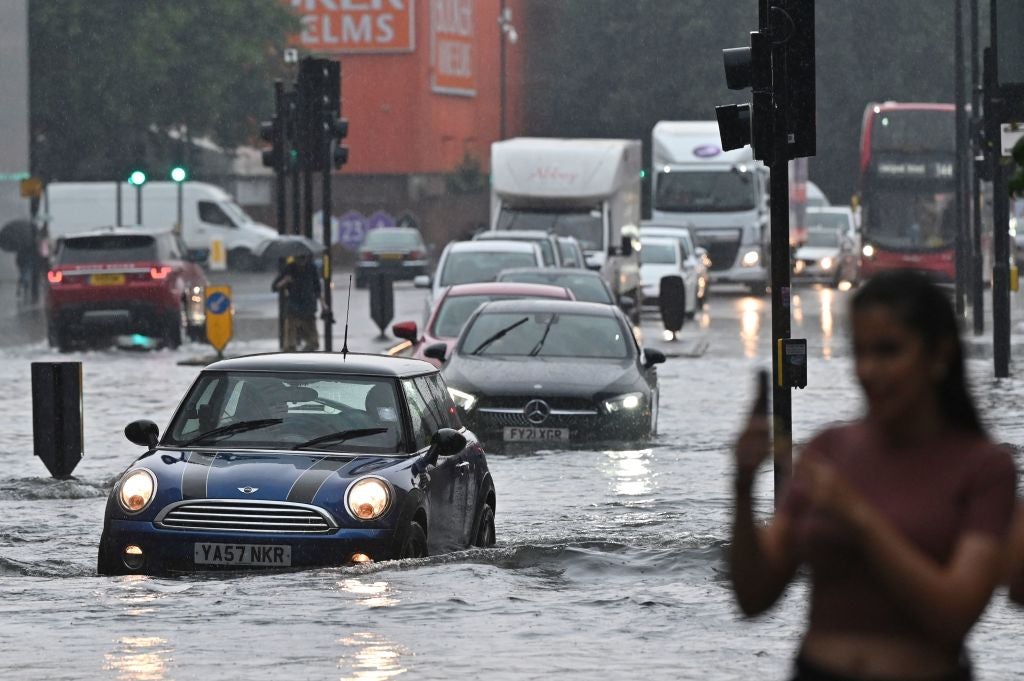Britain needs stronger defences against extreme weather
Editorial: For 30 years the UK has done astonishingly little to prevent climate change or ‘live with it’. The recent floods are surely something even the most complacent government cannot choose to ignore

The evacuation of critically ill patients from flooding in hospitals in the south of England brings to mind how global catastrophes can quickly overtake the ability of mankind to control them. In this case, we find the Covid and climate change crises conspiring to make caring for the sick more difficult, if not impossible. Yet another day of freakishly heavy rain left much of Britain inundated, and not for the first time.
As with the recent deadly floods in western Europe and China, or the burning of Australia and Siberia, the pattern of unprecedented extreme weather events continues, with varying but devastating consequences, from the creeping desertification of sub-Saharan Africa to the gradual submerging of Bangladesh.
The typhoons, floods and unusually intense hurricanes seen across the planet derives from a simple meteorological fact – hotter air carries more moisture. That much we know, and it would help explain why places such as Worcester and Salisbury have for some years been underwater so often. Even though there is a chance that mankind can limit the rise in global temperatures to 1.5C, it is also true that things could turn out worse without the global will to succeed.
The latest scientific research suggests that extreme weather events will be 80 times more frequent by 2080. Over the next two weeks, experts on the Intergovernmental Panel on Climate Change will finalise the first instalment of its sixth assessment report on the climate crises. This will revise the assumptions for decision makers about trends in greenhouse gas emissions and projections for future warming and its impacts. It is unlikely to be encouraging reading as leaders prepare for the UN climate conference, Cop26, in Glasgow in November.
Yet adjustments, defences and precautions needed to cope with the level of climate change right now have obviously still not been implemented. There have been historic defences against nature built in the Fens and in the London basin, with the Thames Barrier, but in much of the country, and particularly in England, flood defence work is woefully late and inadequate.
The parallel with the response to the Covid pandemic is stark and striking. In both cases, scientists have been warning that some sort of catastrophic event was approaching. Such acts of nature and phenomena cannot be timed, nor described in detail.
Coronavirus, on the other hand, had precedents, and the British government, at least, had made woefully inadequate provision for the kind of protective equipment, respirators and intensive care capacity that would, most likely, be caused by a virus that tended to act on the respiratory system, resulting in organ failure and pneumonia. Governments tended to assume it might not happen on their watch, if at all, and more pressing issues – financial crises, Brexit – usually grabbed their attention. That was understandable, or at least comprehensible, but the consequences have been all too visible over the last 18 months.
With the climate crisis, the excuses are even more flimsy. The recent flooding was no one-off shock to the system. The climate crisis is something that has provoked debate and periodic, inadequate, attempts at concerted action to limit it since the science emerged in its current form in the middle 1980s, and the first climate change conference in Rio de Janeiro in 1992.
After 30 years, Britain has still done astonishingly little to prevent the climate crisis or to “live with it”, to adopt a current phrase. Farming and forestry practices, planning rules (especially on flood plains), flood defences, coastal defences, building regulations (for stronger foundations), water supplies, reservoir management, civil emergency planning and increased flood-proof hospital capacity have hardly been addressed, given the reality of the challenges.
There still seems to be the usual assumption that things will turn out OK, or that events will be so far into the future that they need not concern the current generation of politicians. But the swings in the weather in Britain over the last few days – record temperatures followed by record rainfall – are surely something even the most complacent government cannot choose to ignore.
Join our commenting forum
Join thought-provoking conversations, follow other Independent readers and see their replies
Comments